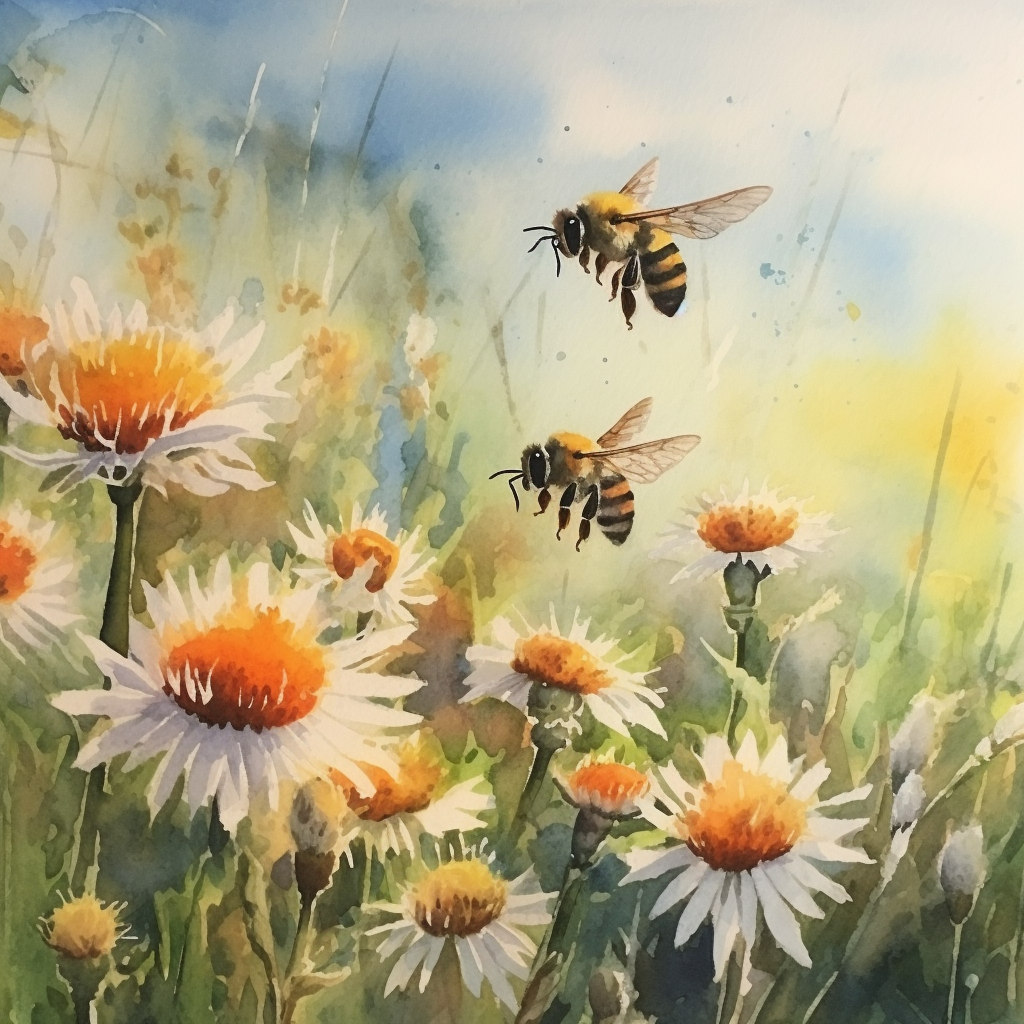Bee
Definition
Bee is a noun that refers to an insect known for its role in pollination and, in some species, honey production. Bees are typically recognized by their black and yellow striped bodies, wings, and ability to sting. They are social insects and often live in colonies with a structured hierarchy.
Parts of Speech
- Noun
Pronunciation
American English
- IPA Pronunciation: /biː/
- Respelling: bee
British English
- IPA Pronunciation: /biː/
- Respelling: bee
Etymology
The word "bee" originates from the Old English "beo," meaning "bee." It has roots in Proto-Germanic "*bijōn" and is related to similar words in various Germanic languages, symbolizing the insect's long-standing presence in human culture and language.
Derivatives
- Beekeeper (noun)
- Beekeeping (noun)
- Beehive (noun)
- Beeline (noun)
- Beeswax (noun)
Synonyms
- Insect
- Honeybee
- Pollinator
Antonyms
- None
Usage
The noun "bee" is used to describe the insect known for pollination and honey production. For example, "The bee pollinated the flowers in the garden," or "She works as a beekeeper managing bee colonies."
Related Terms
- Hive: The structure where bees live and produce honey.
- Pollination: The transfer of pollen from one flower to another, often facilitated by bees.
- Nectar: The sweet liquid collected by bees from flowers.
Detailed Definitions
Noun
- An insect known for its role in pollination and honey production: Refers to the insect belonging to the family Apidae, significant for agricultural and ecological purposes.
- Example: "A bee landed on the flower to collect nectar."
- A social insect living in a structured colony: Describes bees' behavior of living in colonies with roles such as worker, drone, and queen.
- Example: "The bee colony is highly organized, with each bee playing a specific role."
bee



🇨🇳 Mandarin (Simplified Chinese)
- 蜜蜂
- IPA: /mì.fēng/
- Respelling: mi-feng
(Note: In Mandarin, "蜜蜂" primarily refers to the honeybee, and there isn't a distinct second meaning for "bee".)
🇮🇳 Hindi
- मधुमक्खी
- IPA: /mədʱuː.məkʰiː/
- Respelling: madhu-makkhi
(Note: In Hindi, "मधुमक्खी" primarily refers to the honeybee, and there isn't a distinct second meaning for "bee".)
🇪🇸 Spanish
- abeja
- IPA: /a'be.xa/
- Respelling: a-be-ha
(Note: In Spanish, "abeja" primarily refers to the honeybee, and there isn't a distinct second meaning for "bee".)
🇫🇷 French
- abeille
- IPA: /a.bɛj/
- Respelling: a-bey
(Note: In French, "abeille" primarily refers to the honeybee, and there isn't a distinct second meaning for "bee".)
🇸🇦 Modern Standard Arabic
- نحلة
- IPA: /ˈnaħlah/
- Respelling: nah-lah
(Note: In Arabic, "نحلة" primarily refers to the honeybee, and there isn't a distinct second meaning for "bee".)
🇧🇩 Bengali
- মৌমাছি
- IPA: /moumaʧi/
- Respelling: mou-machi
(Note: In Bengali, "মৌমাছি" primarily refers to the honeybee, and there isn't a distinct second meaning for "bee".)
🇷🇺 Russian
- пчела
- IPA: /pt͡ɕɛla/
- Respelling: pche-la
(Note: In Russian, "пчела" primarily refers to the honeybee, and there isn't a distinct second meaning for "bee".)
🇵🇹 Portuguese
- abelha
- IPA: /ɐ'beʎɐ/
- Respelling: a-bel-ya
(Note: In Portuguese, "abelha" primarily refers to the honeybee, and there isn't a distinct second meaning for "bee".)
🇮🇩 Indonesian
- lebah
- IPA: /'lɛ.bah/
- Respelling: le-bah
(Note: In Indonesian, "lebah" primarily refers to the honeybee, and there isn't a distinct second meaning for "bee".)
🇩🇪 German
- Biene
- IPA: /ˈbiː.nə/
- Respelling: bee-ne
(Note: In German, "Biene" primarily refers to the honeybee, and there isn't a distinct second meaning for "bee".)
🇯🇵 Japanese
- 蜂 (はち)
- IPA: /hat͡ɕi/
- Respelling: ha-chi
(Note: In Japanese, "蜂" primarily refers to the honeybee and other types of bees, and there isn't a distinct second meaning for "bee".)
🇻🇳 Vietnamese
- ong
- IPA: /ɔŋ˧˩/
- Respelling: ong
(Note: In Vietnamese, "ong" primarily refers to the honeybee, and there isn't a distinct second meaning for "bee".)
🇰🇷 Korean
- 벌 (beol)
- IPA: /bʌl/
- Respelling: beol
(Note: In Korean, "벌" primarily refers to the honeybee and other types of bees, and there isn't a distinct second meaning for "bee".)
🇹🇷 Turkish
- arı
- IPA: /aːɾɯ/
- Respelling: a-ru
(Note: In Turkish, "arı" primarily refers to the honeybee, and there isn't a distinct second meaning for "bee".)
🇵🇰 Urdu
- مکھی
- IPA: /mʌkʰiː/
- Respelling: mukh-ee
(Note: In Urdu, "مکھی" can mean any kind of fly or bee, but is commonly used for bee. There isn't a distinct second meaning for "bee".)





